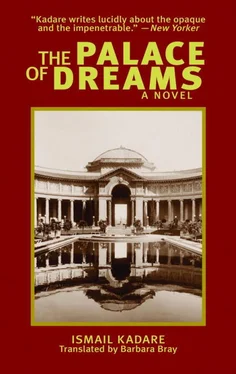Suddenly Mark-Alem thought of the man he’d met on his first day. Where was he? For several days Mark-Alem had looked for him among the crowd of clerks in the coffee break, but he’d never seen him anywhere. Perhaps he’s not well, he thought. Or he might have been sent on an assignment to some distant province. He might be one of the Tabir’s inspectors, who spent most of their time away on official missions; or he might be just an ordinary messenger.
Mark-Alem imagined the thousands of Tabir Sarrail offices scattered all over the vast country—the makeshift buildings, sometimes mere shacks, housing them and their even more modest staff. This usually consisted of two or three hard-worked, ill-paid clerks ready to bow to the ground before the meanest courier from the Tabir when he came to collect the dreams, stammering and stuttering and crawling to him just because he represented the Center. In some remote areas the inhabitants of subprefectures would set out before dawn and trudge through the rain and mud to relate their dreams in these dismal little offices. They’d bellow from outside, not bothering to knock at the door: “Are you open yet, Hadji?”
Most of them couldn’t read or write, so they came very early in the day so as not to forget their dreams, not even stopping for a drink at a nearby tavern. Each one would tell his story to a drowsy-eyed copyist who cursed both the dream and the dreamer. “God grant us better luck this time!” some would say when they’d finished. There was a time-honored legend about some poor wretch who lived in a forgotten byway and whose dream saved the State from a terrible calamity. As a reward the Sovereign summoned him to the capital, received him in his palace, told him to take his choice among the royal treasures, and even offered him one of his nieces in marriage. And so on. “God grant…” the yokels would repeat as they set off through the mud again, most of them probably heading for the tavern. The copyist would watch them go sardonically, and before they disappeared around the bend in the road, he would mark their dreams “Useless.”
Despite strict instructions that they should judge dreams completely impartially and without prejudice, this was how the clerks carried out the first selection. The local inhabitants were an open book to them. Even before a new arrival crossed the threshold of their office they knew whether he was a hellraiser, a drunk, a layabout, or suffered from an ulcer. This attitude had often caused problems, and a few years before it had been decided that the first sifting should no longer be entrusted to the local offices. But the ensuing flood of dreams converging on central Selection was so great the decision had to be revoked, and the first sifting continued to be done locally for want of a better solution.
Naturally the dreamers themselves knew nothing of all this. Every so often they would come to the door and ask, “Well, Hadji, any answer about my dream?”
“No, not yet,” replied Hadji. “Patience, Abdul Kader! The Empire’s a big place, and even though they work day and night the central office can’t keep up with all the dreams they’re sent.”
“Yes, of course. You’re right,” the other would answer, gazing at the horizon in the direction where he imagined the Center to be. “How can we know anything about affairs of State?” And he’d clump off in his clogs to the pothouse.
Mark-Alem had learned all this the morning before from an inspector at the Tabir with whom he’d had coffee. The inspector was just back from a distant Asian province and was about to set out again for the European part of the Empire. What he said took Mark-Alem aback. Could everything really begin in so humble a manner? But the inspector, as if sensing his disappointment, hastened to explain that it wasn’t like that everywhere. Some local sections were in solid buildings in imposing cities in Asia and Europe, and those who brought their dreams there were not poor yokels but distinguished people loaded down with honors and titles and university degrees—people of wit, intelligence, and ambition. The inspector expatiated for a while on this point, and Mark-Alem’s image of the Tabir Sarrail gradually regained its former luster. The inspector was just launching into an account of some other episodes in his travels when the bell interrupted him; and now Mark-Alem was trying to imagine the rest for himself. He thought of the peoples who lived on the left side of the Empire and of those who lived on the right; of those who had many dreams and those who had few; of those who were quite ready to tell their dreams and those, like the Albanians, who were very reserved about them (Mark-Alem set great store by his Albanian origins and automatically registered anything that concerned Albania). He thought of the dreams dreamed by peoples in a state of revolt, by peoples who’d been the victims of cruel massacres, by peoples who suffered from periods of insomnia. The latter were a source of special anxiety to the State, since after a latent period a sudden resurgence was to be expected. So special measures were taken in advance to deal with it.
When his informant had spoken of whole peoples suffering from insomnia, Mark-Alem had looked at him in astonishment.
“I know it may strike you as strange,” said the other, “but it has to be understood relatively. A people is deemed to be suffering from insomnia when its total amount of sleep descends appreciably below the norm. And where is anyone in a better position to assess this difference than in the Tabir Sarrail?”
“Of course,” agreed Mark-Alem. He remembered his own recent sleepless nights, though he quickly told himself the sleeplessness of a whole nation must be very different from that of an individual.
He started glancing covertly again to right and left. All the other members of staff seemed to be deep in their papers, as spellbound as if the files, instead of consisting merely of written pages, were braziers giving off intoxicating fumes. Perhaps I’ll gradually succumb to that fascination too, thought Mark-Alem morosely, and end up forgetting all about the world and the human race.
In the past week, in accordance with his boss’s directive, he’d spent half a day with an elderly clerk in each of the rooms belonging to Selection, so as to familiarize himself with every aspect of the work and acquire some experience. Then, two days ago, when he’d finished his tour of all the operations, he’d come back to the desk that was allocated to him on the day he was first appointed.
His peregrinations from one room to another had given Mark-Alem a general view of the way the Selection department worked. After the first scrutiny in the Lentil Room, the dreams rejected as valueless were done up in big bundles and sent to Archives, while those that were retained were divided into groups according to the subjects they were related to. The groups were: security of the Empire and of the Sovereign (plots, acts of treachery, rebellions); domestic politics (first and foremost the unity of the Empire); foreign politics (alliances and wars); law and order (extortion, injustice, corruption); signs of a Master-Dream; and miscellaneous.
The sorting of dreams into divisions and subdivisions was no easy matter. There had been long discussions as to whether the task should be entrusted to Selection or to Interpretation. It would have gone to Interpretation if that section hadn’t been so overworked already. Finally a compromise solution was found: Selection was to classify the dreams, but only in a tentative and preliminary way. So each file was headed not “Dreams concerned with such and such a subject” but “Dreams possibly concerning such and such a subject.” Furthermore, while Selection bore the entire responsibility for dividing dreams into those that were useless and those that were of interest, it had no responsibility at all concerning any further classification. Which meant that Selection dealt essentially with basic sorting. Sorting was the raison d’être of Selection, and interpretation the raison d’être of the Tabir Sarrail as a whole.
Читать дальше












